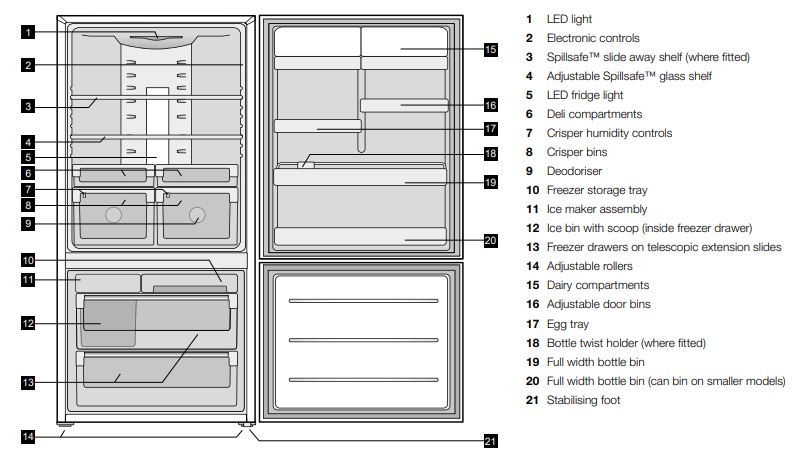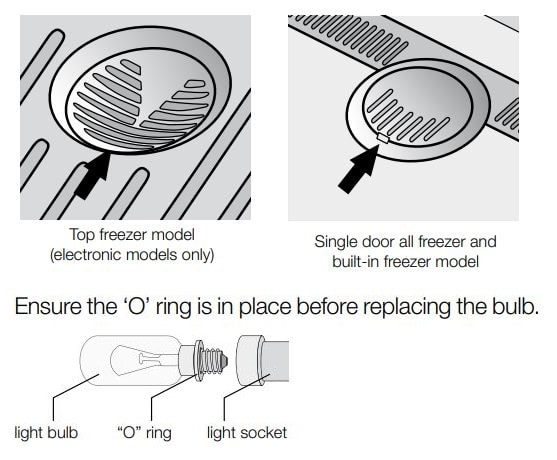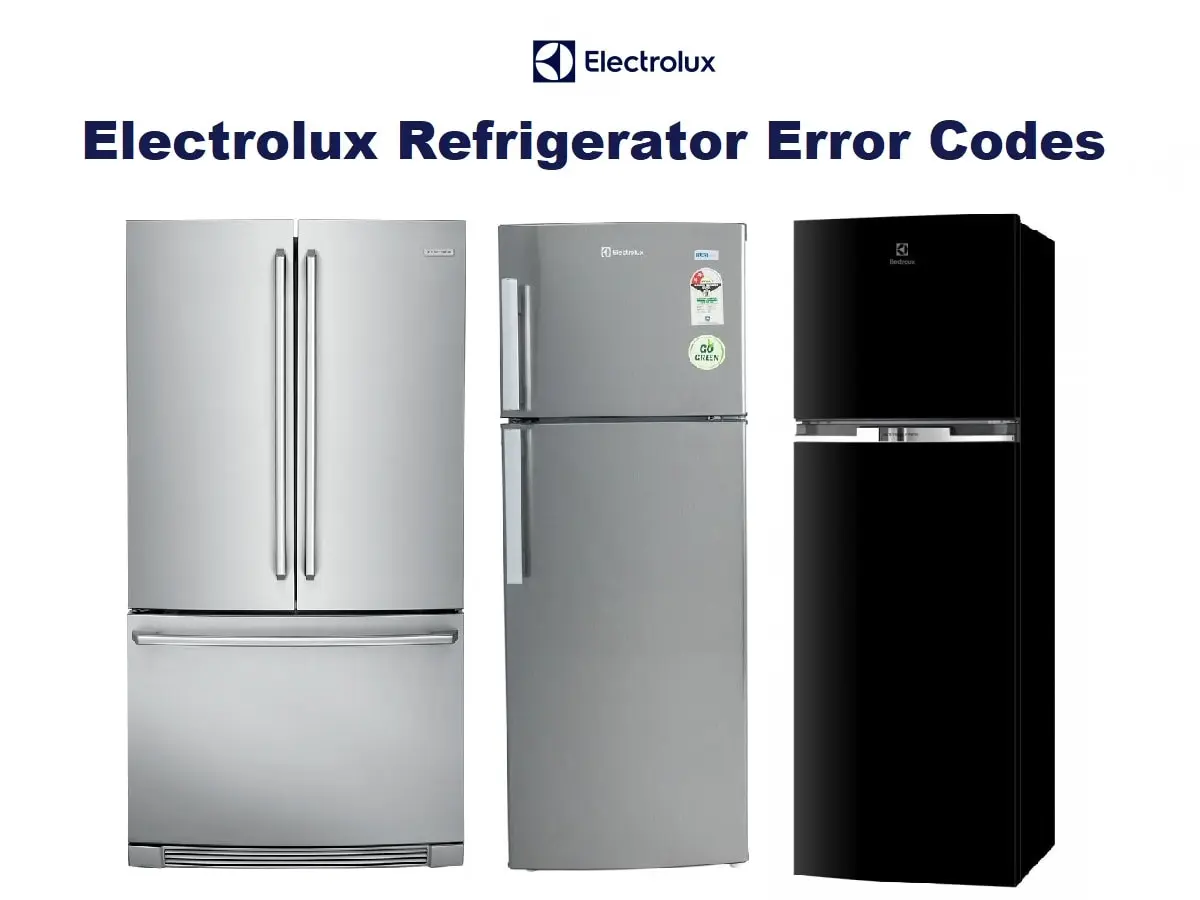Electrolux is the second largest appliance manufacturer – by units sold. Listed right after Whirlpool, the company has come a long way since its inception. A collaboration between two minds brings you some of the best appliances you have seen on the market.
With a complete range, you can choose from various products the company has to offer. Making sure you get an appliance that not only matches your requirements. In addition, it offers you the peace of mind you need to have when making an investment.
Electrolux refrigerators are known for their sturdy build and solid hardware. That being said, there might come a time when you will encounter an error, so rather than panicking, note it down and match it using the Electrolux refrigerator error codes below.
Error Messages
| Error Codes | Solution |
|---|---|
| E0 | No error |
| E1 | Evaporator sensor damaged |
| E2 | Room temperature sensor damaged (installed on the display board) |
| E4 | Room temperature sensor damaged (installed on the power board) |
| E5 | 0 degree compartment sensor damaged |
| Er | http://IM/RAM Error. Check J4-4, J4-5 and J4-6 Connector on Icemaker board. Check J4 connector at Main Control board. Check 15 pin inline connector at control board, Pin#’s 4,9 & 14. If all connections test good, control board. |
| t3 | TH3 Sensor (open or short) Go to flow chart for Ice t3 |
| CE | IM Com Lost Go to flow chart 50C. Put into service mode to verify. |
| OP - Normal | Freezer Sensor OPEN |
| SH - Normal | Freezer Sensor SHORTED |
| Normal - OP | Fresh Food Sensor OPEN |
| Normal - SH | Fresh Food Sensor Shorted |
| SY - EF | Evaporator Fan Failure |
| SY - CE | Communication Error |
| SY - CF | Communication Failure |
| Ec | Master PCB receive communication failure |
| Ed | If defrost fault , it will show "Ed", otherwise display "--" |
| EF | If fan motor trouble, it will show "EF", otherwise display "--" |
Parts Meaning

Troubleshooting
If you think something may be wrong with your refrigerator, you can carry out some easy checks before calling for service. You may locate the problem, sparing yourself from inconvenience, saving time and money.
| Problem | Solution |
|---|---|
| Refrigerator is not operating | Check that the power cord is plugged into the power outlet properly and that the outlet is switched ‘ON’. |
| Try running another appliance from the power outlet. If no power is coming from the outlet you may have blown a fuse or tripped a circuit of your household power supply. | |
| Try adjusting the temperature control to a slightly “colder” position. | |
| It is normal for the freezer fan NOT to operate during the automatic defrost cycle, or for a short time after the appliance is switched on. | |
| When there is refrigerator/ freezer noise | Occasional gurgling, similar to water boiling. |
| Air flow noise (air circulates because of a small fan). | |
| A popping noise heard during automatic defrost. | |
| A clicking noise heard just before the compressor starts (this is just the automatic switching action of the temperature control, turning the compressor on or off). | |
| If there are odours inside the refrigerator | The interior may need cleaning. |
| Some foods produce odours. | |
| Some containers and wrapping can cause odours. | |
| Ask yourself if the odour started about the same time you started storing something unusual. | |
| When the motor seems to run more than expected | Your new refrigerator has a large fridge and freezer section to keep cool. So it is normal to frequently hear the sound of the motor. However, to keep operation to a minimum check the following: Are doors kept open too long or too often? Are controls set too cold? Have large amounts of warm food just recently been stored? Summer, festive seasons and holidays usually mean a lot more work for your refrigerator. If the day is hot or the room is very warm, the refrigerator will need to run more than normal. |
| If the temperature in the refrigerator is too warm | Check that the appliance has enough clearance at the sides, back and top. |
| Refer to ‘Controlling the temperature’ on page 12. | |
| You may have kept the door open too long or too frequently. | |
| Food containers or packaging may be holding a door open. | |
| If the temperature in the refrigerator is too cold | Refer to ‘Controlling the temperature’ on page 12. |
| Increase the temperature to avoid high energy consumption. | |
| If heavy frosting occurs in the freezer | Make sure you fully close the freezer and fridge doors. If the doors are left open, a heavy frost will coat the inside of the freezer. If a frost develops, remove it and take care to properly close the doors. |
| If water drips on the floor | The defrost water tray, (located at the back or underneath of the cabinet) may not be properly positioned, or the drain tube may not be properly positioned to direct water into this tray. You may need to pull the refrigerator away from the wall to check the tray and tube. |
| Fridge does not exit vacation mode | Turn appliance off at the power point. Leave off for three (3) minutes for the memory to clear, then turn back on. |
| If the doors will not close | Check whether something is holding the door open. |
| When temperature is hot/warm on the outside and rear side of the refrigerator | In normal operation, the refrigerator transfers heat from inside to outside of the cabinet. It is normal for the side and rear of the refrigerator to feel warm/hot while operating. This will be more noticeable during start up and hot ambient conditions. |
| The ice maker is not making any ice | Ice maker is in the OFF position. See Ice maker section in user manual: turn switch to ON position. |
| Water tap is turned off. Turn on the water tap. | |
| The freezer is not cold enough. See the Problem section: ‘If the temperature in the refrigerator is too warm’. | |
| The water dispenser may not be dispensing water. If it isn’t, the ice & water filter cartridge may be clogged or restricted by foreign material, and will need to be replaced. | |
| Filter may be blocked. Check and/or change filter. | |
| The ice-maker is not making enough ice. | The ice maker is producing less ice than you expect. The ice maker should produce approximately 0.5-1 kilogram of ice every 24 hours. |
| Household water tap is not open. Open the household water tap. | |
| The water dispenser is dispensing slower than normal. Replace the water filter cartridge. | |
| The freezer is not cold enough. See section ‘Controlling temperatures’. | |
| Ice cubes are too small or too big | Restricted water flow to the ice maker. Replace the filter cartridge, as the water filter cartridge may be clogged. |
| Water pressure may be too low. Check water supply hose for kinks. | |
| Water pressure may be too high. Check water pressure meets minimum and maximum requirement (see install instructions). | |
| The ice has a bad odour and taste | The ice has picked up odour or flavour from strongly flavoured food stored in the refrigerator or freezer. Cover foods tightly. Discard stale ice. The ice maker will produce a fresh supply. |
| The water running into the ice maker has poor taste or colour. Add or replace water filter to water supply. Consult a water purifying company. | |
| Ice not used frequently enough. Discard stale ice monthly. |
Care And Maintenance
Freezer light (where fitted)

- Switch off the power at the power point and remove the refrigerator’s power cord from the power point.
- Carefully unclip the light cover. You do this by pulling the light cover tab at the rear towards the front of the cabinet.
- Unscrew the light bulb and replace it with a bulb that is the same as the original. If, when you remove the light bulb the small rubber “O” ring comes out with the bulb, fit the “O” ring over the new bulb and screw bulb into the socket (see diagram below)
Doors and exterior – stainless steel
Your stainless steel appliance is manufactured from a mark resistant stainless steel. This stainless steel has a special advanced protective coating that eases the removal of marks such as finger prints and water spots. To keep your stainless steel appliance looking at its best, you should clean it regularly. You should only clean the stainless steel doors with luke-warm soapy water and a soft cloth, rinsing with clean water and then wipe the surface with clean water and a soft clean cloth to remove soap residue.
It is important to wipe in the direction of the grain of the stainless steel to avoid undue marking of the surface.
Doors – surface hardened acrylic
You should only clean the acrylic doors with lukewarm soapy water and a soft cloth, rinsing with clean water and the wipe the surface with clean water and a soft clean cloth to remove soap residue.
Flashing Lights


